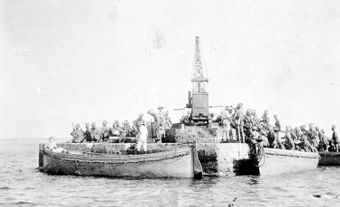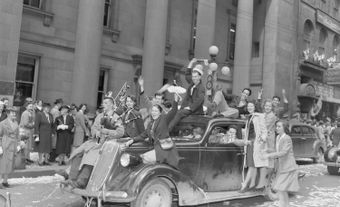Robert Heriot Barclay
Robert Heriot Barclay, naval officer (b at Kettle [Kettlehill], Scotland, 18 Sep 1786; d at Edinburgh 8 May 1837). Robert Barclay was only 11 when he began his naval career in 1798, joining the crew of the 44-gun ship Anson as a midshipman. He was transferred to Lord Horatio Nelson's legendary flagship, Victory, in early 1805. In March 1805 Barclay became a lieutenant aboard the Swiftsure, and took part in the decisive British victory over the French fleet at the Battle of Trafalgar, 21 Oct 1805. A terrible storm followed the battle, forcing the Swiftsure to cut free the captured French ship the Redoubtable. Barclay saved 170 of her seamen before she sank in the Atlantic.
He soon earned a name for not just courage, but skill, as a second lieutenant of the 38-gun ship Diana in the English Channel. In November 1809, while in command of a detachment of boats targeting a French convoy, Barclay lost his arm. After recovering from his injury he was sent to North America, awaiting a promotion that did not come. Instead, he found himself assigned to the schooner Bream, the gunship Aeolus (32 guns), and the sloop Tartarus. Between 1810 and 1812, he served primarily on the 36-gun Iphigenia. The War of 1812 would offer him one last chance at naval glory.
As war began, the commander-in-chief of the North American station, Admiral Warren, detached Barclay, Robert Finnis and Daniel Pring to become the "Captains of the Corvettes" on the Great Lakes. Barclay was initially sent to Halifax in February 1813. With a handful of officers he journeyed to Kingston and became acting commander of all British naval forces on the Great Lakes, 5 May 1813. He was soon superseded by Captain Sir James Lucas Yeo, and then took command of forces on Lake Erie. Barclay was not Yeo's first choice, but when Captain William Howe Mulcaster turned down the appointment (Lake Erie was of secondary importance compared to the more critical theatre in Lake Ontario), Yeo agreed to appoint the one-armed officer.
After a difficult overland journey to Amherstburg, Barclay took command of the 16-gun ship Queen Charlotte and the small local squadron. While he outnumbered the Americans in ships, he was taxed on supplies and trained officers, and found little support from Yeo, whose main concern was the ships on Lake Ontario. Barclay's advantage in numbers would not last forever, but he was unable to launch a naval assault on the American dockyard due to a sandbar in the harbour's mouth. Barclay asked for land support. If Major-General Francis de Rottenburg and his men could destroy Perry's base in Erie, Pennsylvania, the outcome for control of Lake Erie could swing in Britain's favour. Rottenburg refused.
Barclay's chief adversary was Captain Oliver Hazard Perry, who had at his disposal ample industrial materials and skilled labour, though he was also limited in the number of experienced seamen for his squadron. But Perry soon was able to outpace Barclay in shipbuilding at Presque Isle, where two 20-gun brigs, Niagara and Lawrence, were being speedily constructed for service. In early August, the Americans were able to float the brigs to the docks by removing their guns and raising the hulls on floats. This move effectively gave the Americans superiority. Perry concentrated his forces, and established a base at Put-in-Bay in the Bass Islands should land operations require naval support. Barclay, not seeing signs of American ships from the US harbour, lifted the blockade he had initiated before heading across the lake to Dover, expecting limited action when he returned. On August 4th, upon his return, he found the Lawrence and smaller vessels at anchor. Battle was now closer, and Barclay was outnumbered and outgunned. He commissioned the vessel Detroit, and prepared his squadron. Barclay was also being urged to action by Major General Henry Procter so he could begin resupplying the British forces at Long Point, who were desperately low on food, basic goods and medicines.
On 9 September, with the weather favourable, Barclay sailed from Amherstburg aboard the Detroit to meet the American forces. By the 10th, around the Bass Islands, he found them and the battle was on by noon. The proper armaments for the Detroit had been lost at York, and she'd been fitted with an assortment of long guns from the ramparts at Fort Malden that provided the advantage of being able to fight at longer ranges than the American vessels. But that was Barclay's only advantage. Perry's brig had better armaments, and six schooners to Barclay's three. Two hours of deadly fire saw the battle sway first toward Barclay, but finally to Perry, as the winds shifted and allowed the Americans to swiftly close with the British ships and nullify Barclay's one advantage. Both flagships were severely beaten. Nearly all the British experienced senior officers were killed or critically wounded, including Barclay; his remaining arm was injured, and part of his thigh was later removed due to its severe injury. Perry accepted Barclay's surrender, and made off with the entire British fleet. American casualties were 27 killed and 96 wounded, most on the USS Lawrence. British and Canadian casualties were 41 fatalities and 94 wounded.
The crushing defeat fostered a court martial where Barclay, wounded but proud, was exonerated of misconduct, and indeed earned some thanks for his bravery during the battle. Procter earned sharp criticism for pushing a naval engagement that, in hindsight, was not favourable to British victory. Barclay was confirmed as a commander on 13 November 1813, and received an admirable pension in addition to funds due him because of his injuries. Still, his defeat caused his personal reputation to be tarnished. His career stalled after the war, and despite some successful promotion due to political patronage, he is best remembered for the loss against Perry.

 Share on Facebook
Share on Facebook Share on X
Share on X Share by Email
Share by Email Share on Google Classroom
Share on Google Classroom

